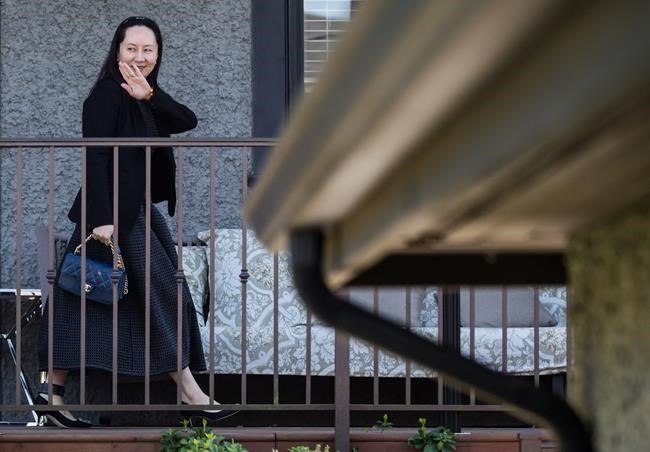
Huawei chief financial officer Meng Wanzhou, who is out on bail and remains under partial house arrest after she was detained Dec. 1 at the behest of American authorities, waves as she returns home after attending a court appearance in Vancouver on May 8, 2019. The case of Huawei senior executive Meng Wanzhou — which has drawn interest from around the world — will return to a Vancouver courtroom this week. Canada's relationship with Beijing has deteriorated rapidly since the December arrest of the Chinese telecom giant's chief financial officer, which was carried out after an extradition request by the United States.
Image Credit: THE CANADIAN PRESS/Darryl Dyck
June 04, 2019 - 9:00 PM
OTTAWA - China's ambassador to Canada says his government wants to end the countries' impasse but won't give way on two of Canada's major complaints.
"Indeed, the bilateral relations between China and Canada are facing serious difficulties right now," Lu said Tuesday at the Chinese Embassy in Ottawa, in an interview through an interpreter. "The Chinese side is not responsible for this issue. But the Chinese government is waiting to make a joint effort with the Canadian side and meet each other halfway."
When asked about the possibility of freeing two Canadians detained in China on espionage charges, however, Lu Shaye offered little wiggle room. And on China's blocking Canadian canola imports, Lu considers the matter closed.
Canada's relationship with Beijing has deteriorated rapidly since the December arrest of a Chinese telecom giant's chief financial officer in Vancouver. The arrest of Huawei's Meng Wanzhou was carried out after an extradition request by the United States.
Meng's arrest has outraged Beijing and Chinese authorities have demanded her release. Since Meng's arrest, China has detained two Canadians on allegations of endangering the country's national security, sentenced two Canadians to death for drug-related convictions and rejected important agricultural shipments, including canola.
Prime Minister Justin Trudeau has sought international support in condemning China's decision to, in his word, "arbitrarily" arrest Michael Kovrig, a Canadian diplomat on leave, and businessman Michael Spavor.
Last week on a visit to Ottawa, U.S. Vice-President Mike Pence linked the liberation of the two imprisoned Canadians to American trade talks with China.
The offer is significant because the Chinese government has rebuffed requests from Foreign Affairs Minister Chrystia Freeland to speak with her counterpart.
Pence said U.S. President Donald Trump would push Chinese President Xi Jinping on Kovrig and Spavor at the G20 leaders' summit later this month. Trudeau is also expected to travel to Japan for that summit.
The ambassador said he did not know if Xi and Trudeau plan to meet at the G20.
When it comes to Kovrig and Spavor, he said "the relevant departments of China will investigate the case, follow the Chinese laws, international practice and the consular agreement between China and Canada, and provide relevant treatment to them."
The decline of Canada-China relations has also led to some important economic consequences.
China has been a huge market for Canadian canola seed, which is crushed to make cooking oil. China imported $2.7 billion worth of Canadian canola seed last year, and any drawn-out blockage will hurt farmers, the industry and the national economy.
China has stonewalled requests for Canadian experts to examine Chinese evidence that two canola-seed shipments contained pests.
Lu said Chinese officials investigated the Canadian canola "based on regulations and science principles."
"The Chinese side provided concrete documents about the investigation," he said. "The relevant Chinese departments maintain no more contact with their Canadian counterparts. The documents have already been provided."
In an interview last week, International Trade Minister Jim Carr said Canada wants to engage with China on the canola issue. In the meantime, Carr said, Canada had been trying to increase canola sales in other markets such as Malaysia, Pakistan, Bangladesh and the United Arab Emirates.
"The reception has been very warm and very positive because they recognize the high quality of our product," Carr said.
The Trudeau government has also come under pressure to follow the American lead and ban Huawei from supplying equipment for Canada's next-generation 5G wireless networks. Pence raised the matter with Trudeau last week in front of reporters.
He argued letting Huawei participate would be against American security interests. Trudeau replied by reiterating that Canadian government would rely on evidence from its own security agencies before making a decision.
Huawei has denied allegations that its digital communications equipment is a tool of Chinese state espionage.
The case of Meng, the telecom giant's senior executive, will return to a Vancouver courtroom on Thursday. It has drawn interest from around the world.
A statement from Canada's Justice Department said Tuesday that the purpose of the proceeding is to address additional applications in Meng's extradition case and to set future court dates.
The new dates will not be for the actual extradition hearing, which has yet to be scheduled, and Meng is not expected to attend Thursday's proceeding in person, the statement says.
The U.S. Department of Justice laid 13 criminal charges, including conspiracy, fraud and obstruction, against Huawei and Meng, who is the daughter of the company's founder.
News from © The Canadian Press, 2019